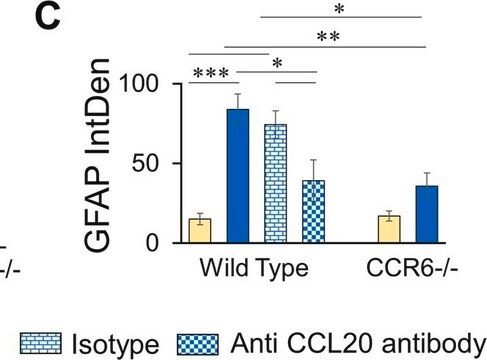C9205
Anti-Glial Fibrillary Acidic Protein (GFAP)−Cy3™ antibody, Mouse monoclonal
clone G-A-5, purified from hybridoma cell culture
Synonym(s):
Monoclonal Anti-Glial Fibrillary Acidic Protein (GFAP) antibody produced in mouse, Monoclonal Anti-Glial Fibrillary Acidic Protein (GFAP)−Cy3™ antibody produced in mouse, Anti-ALXDRD, Anti-GFAP
About This Item
Recommended Products
biological source
mouse
Quality Level
conjugate
CY3 conjugate
antibody form
purified immunoglobulin
antibody product type
primary antibodies
clone
G-A-5, monoclonal
form
buffered aqueous solution
species reactivity
human, pig, rat
technique(s)
direct immunofluorescence: 1:400 using alcohol-fixed, paraffin-embedded rat brain sections
isotype
IgG1
UniProt accession no.
shipped in
wet ice
storage temp.
2-8°C
target post-translational modification
unmodified
Gene Information
human ... GFAP(2670)
rat ... Gfap(24387)
Looking for similar products? Visit Product Comparison Guide
General description
Specificity
Immunogen
Application
- immunohistochemistry
- immunoblotting
- immunolabelling,
- immunocytochemistry
- immunofluorescence
Biochem/physiol Actions
Physical form
Legal Information
Disclaimer
Not finding the right product?
Try our Product Selector Tool.
antibody
related product
Storage Class Code
10 - Combustible liquids
WGK
nwg
Flash Point(F)
Not applicable
Flash Point(C)
Not applicable
Personal Protective Equipment
Choose from one of the most recent versions:
Certificates of Analysis (COA)
Don't see the Right Version?
If you require a particular version, you can look up a specific certificate by the Lot or Batch number.
Already Own This Product?
Find documentation for the products that you have recently purchased in the Document Library.
Customers Also Viewed
Our team of scientists has experience in all areas of research including Life Science, Material Science, Chemical Synthesis, Chromatography, Analytical and many others.
Contact Technical Service













